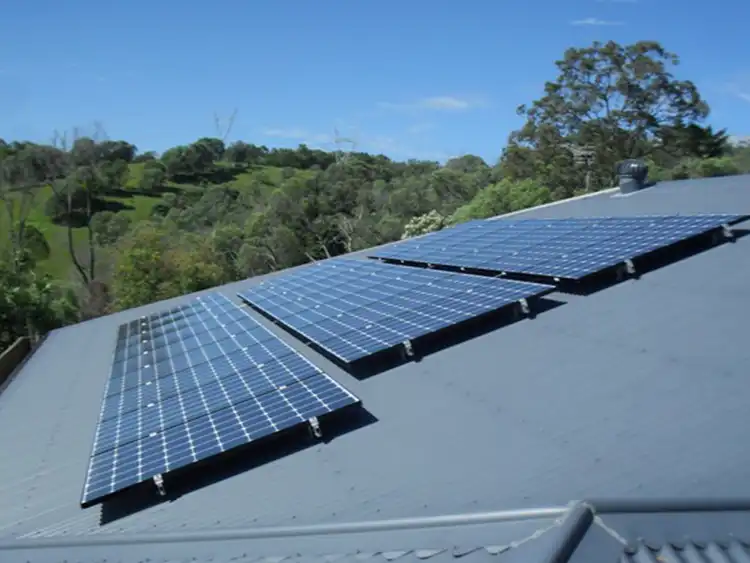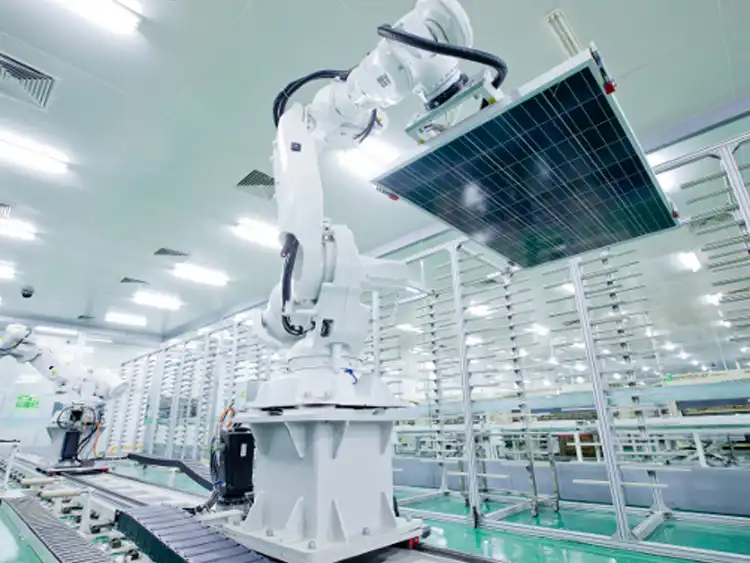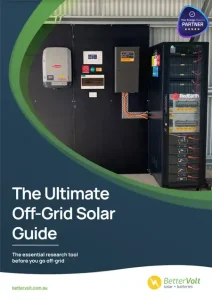Off Grid Solar
Living off the grid offers a unique sense of freedom and autonomy, but it also places the responsibility for reliable power generation solely on your solar system.
That’s why off-grid systems from Better Volt are designed specifically for remote, rural, and semi-rural homes where 24/7 reliability is key.
Unlike grid-connected or hybrid systems, designing off-grid solar requires a meticulous approach. During our initial consultation, we’ll work with you to create a detailed load profile that factors in ALL your energy usage and power demands. This ensures the system is perfectly sized to meet your needs, even during periods with limited sunlight.
Embrace energy independence and a sustainable future with a custom-designed off-grid solar system from BetterVolt.


Why quality and good design is important
Living off-grid grants you freedom and self-reliance, and one of the keys to achieving this is with a high quality, reliable solar system. That’s why choosing quality components is crucial. Unlike on-grid systems with backup options, an off-grid system failure means you’ll be without power.
High-efficiency solar panels ensure maximum energy capture, and robust batteries with extended warranties guarantee long-lasting storage. Investing in quality inverters translates to safe and efficient power conversion, while reputable brands provide better after-sales support.
Don’t settle for short-term savings on lesser components – consider it an investment in peace of mind and a secure, sustainable energy future for your off-grid haven.
Blackout protection
Living off the grid doesn’t mean living in the dark! Off-grid solar systems offer the ultimate blackout protection for rural homes. Unlike grid-reliant systems that become powerless during outages, off-grid setups function independently, ensuring you stay illuminated even when the neighborhood plunges into darkness.
The secret lies in battery storage. Off-grid systems utilise deep cycle or advanced lithium batteries to capture excess solar energy during the day. This stored energy becomes your personal power reserve, ready to be tapped into whenever the sun isn’t shining or a blackout strikes.
Our systems are designed to provide power for 3-5 days with limited sunlight, giving you ample buffer during outages. Plus, unlike generators that require manual intervention, off-grid systems can be seamlessly integrated with automatic transfer switches. These intelligent switches automatically detect a grid outage and switch your home to battery power, ensuring a smooth transition without any disruption.


Maintaining your off grid system
Unlike grid-connected systems, with off-grid solar, there’s no flicking a switch to restore power. Here, your solar system is your sole source of energy. That’s why regular maintenance becomes even more crucial for off-grid setups.
Think of it as preventative medicine for your power source. Regular maintenance ensures your system operates at peak efficiency, maximising energy capture from sunlight. This translates to sufficient power generation, even during extended cloudy periods. Our technicians at BetterVolt can identify and address minor issues before they snowball into major problems, potentially leaving you without power for days.
Investing in routine maintenance goes beyond just keeping the lights on. It safeguards the lifespan of your entire system. Cleaned panels capture more sunlight, while inspections ensure proper battery health and inverter functionality.
This proactive approach minimises the risk of sudden breakdowns, saving you from costly repairs and potential replacement needs down the line.
FAQs
What is a grid-supported hybrid solar system?
A Grid Support Hybrid Solar System, or solar-plus-storage system, combines solar panels with a battery to give homes a more reliable and efficient energy source. This system works with the electricity grid but also has a battery to store extra energy. It’s like having a backup electrical supply for your home.
Here’s how it works: Solar panels on your roof capture sunlight and turn it into electricity. This electricity can power your home right away or be saved in the battery for later use. When you need power and the sun isn’t shining, or during a power outage, you can use the stored energy from the battery.
The system also includes a solar inverter, which helps convert solar energy and battery power into the type of electricity your home uses. This way, you can use the energy to run your appliances and electronics.
This type of system is great for areas with unreliable power grids or frequent power outages. It helps make sure you have enough energy to power your home, even when the grid is down. Plus, it can help you save on electricity bills by using solar energy.
How Grid Support Hybrid works:
- The system obviously uses solar panels: These convert sunlight into electricity. During the day, the solar panels generate power which can be used to run your household appliances. They also feed into batteries for use at night or during rainy days.
- You will need battery storage: Excess electricity generated by the solar panels is stored in the battery system. This stored energy can be used during the night or when solar production is insufficient to meet your household’s energy demands. The batteries need to be located in a safe location and also prefer to be isolated from heat.
- You still have an existing grid connection: We do not recommend going off the grid, even if your current connection is weak. While the system prioritises solar energy and stored battery power, it remains connected to the grid, as a backup/safety net. This ensures that if the battery is depleted and solar production is insufficient, the household can still draw power from the grid and also charge the batteries.
- You will need a quality hybrid Inverter: This component converts DC electricity from solar panels and the battery into AC electricity, which is what most household appliances use. Modern hybrid inverters can manage both solar generation and battery storage, seamlessly switching between sources.
Better Volt has installed over 150 hybrid on grid solar systems from Coff’s Harbour all the way to Wollombi. The most popular system size is 10 kW of PV with 30 kWh of lithium ion batteries. Such as system is capable of generating in a place like Dorrigo for example approx. 14,800 kWh per annum, 1230 kW average per month and 41 kWh per day. Naturally there will be a variance in output by months and why not check out the YEA output calculator to get more info.
Advantages of a grid-supported hybrid solar system
- Avoids costly grid system upgrades: Having the grid upgraded improves the energy retailers’ infrastructure, but you are paying for it. Would it not be better to create the infrastructure so that your own electricity bills go down?
- Energy independence: Reduces reliance on the grid, particularly valuable in areas with weak grid infrastructure or frequent outages.
- Cost savings: Solar energy can offset electricity costs. Additionally, by storing solar energy, you can avoid drawing expensive grid power during peak times if your utility uses time-of-use charges.
- Increased reliability: The system provides a continuous power supply, leveraging the battery during solar energy production downtimes or grid outages.
- Environmentally friendly: Utilising solar energy reduces the household’s carbon footprint and promotes renewable energy use.
- Flexibility and scalability: Systems can be designed to meet specific energy needs and scaled up if energy needs increase.
Considerations:
- Initial investment: The upfront cost for solar panels, battery storage, and a hybrid inverter is not comparable to a cheap grid solar system. The cost can reach easily some 5 figures though this initial investment is often mitigated by long-term savings and some alternatives such as grid upgrades which can be more.
- Battery lifespan: Batteries have a finite lifespan, nevertheless with new technologies a decade can now be expected of the better brands, which also require less maintenance.
- Overall PV system maintenance: While generally low, the grid-supported hybrid solar system does require some maintenance every few years to ensure optimal performance.
- Installation space: Adequate space is needed for solar panels and the battery system, usually on a wall without too much direct sunshine, in a garage or other area protected from weather and heat if possible.
In summary:
A grid-supported hybrid solar system is a smart choice for households that have unreliable or weak connections to the electricity grid. This system gives homeowners more control over their energy use, leading to greater energy independence, cost savings, and environmental benefits.
Choosing a grid-supported hybrid solar system is a forward-thinking decision. It allows homeowners to increase the comfort level in their homes by using more electricity for heating, cooling, and appliances. At the same time, it harnesses renewable energy from the sun, reducing reliance on fossil fuels and lowering carbon emissions.
With this system, you can enjoy consistent power availability, even during power outages, thanks to the battery backup. This ensures that your home stays comfortable and functional, no matter what the grid is doing.
Overall, a grid-supported hybrid solar panel system offers a sustainable and reliable energy solution that benefits both homeowners and the environment. It’s a great way to take control of your energy use, save money on electricity bills, and contribute to a greener future.
When designing and planning such a power supply the initial investment cost will be off-set via long-term savings and it is recommended to engage an off-grid solar specialist like Better Volt Solar & Batteries in your planning phase.
Why go off-grid or hybrid solar solutions with BetterVolt?
If you’re considering going off-grid in Coffs Harbour, understanding the potential output of solar systems is crucial. Here’s a breakdown of the estimated output for different sizes of solar systems in the area:
- 3 kW Solar System: Generates approximately 4,704 kWh of output annually, averaging around 13 kWh daily.
- 6.6 kW Solar System: Produces approximately 10,351 kWh of output annually, with an average daily output of 28 kWh.
- 10 kW Solar System: Yields about 15,680 kWh of output annually, providing an average of 43 kWh daily.
- 13.2 kW Solar System: Generates approximately 20,699 kWh of output annually, averaging around 57 kWh daily.
- 15 kW Solar System: Provides about 23,523 kWh of output per year, with an average daily output of 64 kWh.
- 20 kW Solar System: Produces approximately 31,362 kWh of output annually, with an average daily output of 86 kWh.
Personalised off-grid systems with BetterVolt
At BetterVolt, we understand that the energy needs of households in Coffs Harbour and the wider surrounding area vary. That’s why we offer customised off-grid or hybrid-grid support solutions to suit your specific requirements. Whether you’re looking for a smaller system to power a cabin or a larger setup for a family home, we have you covered.
Expertise in off-grid living
With over ten years of experience in standalone and grid-support hybrid solar solutions, BetterVolt has the expertise to handle any off-grid challenge. Our team of specialists has successfully completed numerous installations in Coffs Harbour, Bellingen, and surrounding areas.
If you want to live off the grid, BetterVolt can help you. If you want to use a solar PV system that works with the electricity grid, BetterVolt can also help you. Our successful solar installations show that we are a trusted choice for solar solutions in the region.
When you choose BetterVolt, you’re choosing a team that is dedicated to delivering quality, reliability, and customer satisfaction. We take pride in our work and strive to exceed your expectations with every project.
So, if you’re considering an off-grid or hybrid solar system in Coffs Harbour, Bellingen, or surrounding areas, trust BetterVolt to deliver a solution that’s tailored to your needs and built to last. With our years of experience and commitment to excellence, you can count on us to get the job done right.
Harnessing solar energy for a sustainable future
Choosing BetterVolt for your off-grid solar needs in Coffs Harbour, Dorrigo, and Blaxlands Creeks means you’re investing in energy independence and helping the environment. We make it easy for you with our quality products and services.
At BetterVolt, we offer reliable products like Selectronics Australian-made inverters. These inverters are known for working well and saving energy, so you can trust your solar system will work efficiently.
We also provide easy-to-use monitoring technology. This lets you see how much energy your solar system is making and using in real time. It helps you use your energy wisely and save even more on your power bills.
By choosing BetterVolt, you’re making a smart choice for your home and the planet. Our solar solutions help you use less electricity from the grid and reduce your carbon footprint.
So, if you want to save money on electricity, be more independent with your energy, and help the environment, BetterVolt has the right solar solution for you. Choose BetterVolt for a brighter and greener future.
Get started with BetterVolt today
Ready to embrace off-grid living in Coffs Harbour and the surrounding areas? Contact BetterVolt today to learn more about our customised solar solutions. With our expertise and quality products, we can help you take the first step towards a sustainable future powered by the sun.
At BetterVolt, we’re committed to providing you with reliable and efficient solar systems tailored to your specific needs. If you want to use less electricity from the grid or not use it at all, we can help. We can design and install the right solar power system for your home or business.
Moving to off-grid living can help you become more self-sufficient, save money on electricity, and reduce your environmental impact. This lifestyle change allows you to rely less on outside resources and generate your own power. By disconnecting from the grid, you can also lower your monthly expenses and minimise your carbon footprint. With BetterVolt’s customised solar solutions, you can enjoy the benefits of clean, renewable energy while also increasing your energy independence.
The difference Between Off-Grid, Hybrid, and Grid-Connected Systems
When deciding between off-grid, hybrid on-grid and grid-connected solar systems for your home, it’s essential to understand the key differences and weigh the advantages and disadvantages of each option. Here’s a comparison of the two systems:
Energy storage dynamics
- Off-grid solar systems store extra power in batteries. This allows for electricity to be available when there is little solar energy, such as at night or on cloudy days. Off-grid systems are independent of the main power grid. They are designed to provide electricity in remote areas or during power outages. The battery bank must be sized adequately to support the home’s energy needs for several days.
- Grid-Tied Solar: In grid-tied systems, storage in solar batteries is optional. Instead, users often opt for a larger solar system and utilise net metering programs. Excess electricity generated during sunny periods is sent back to the grid in exchange for credits, which can be used when solar production is insufficient.
- Hybrid-Grid Tied gives you enough battery capacity to increase local power consumption, without relying on the grid to do all the heavy lifting. It is an excellent solution in the local area around Coffs Harbour.
Access to electricity
- Off-Grid Solar: With off-grid systems, electricity is available only when solar panels generate power or from stored energy in solar batteries. Users must rely on stored electricity during periods of low solar generation, emphasising the importance of a reliable and well-designed solar array.
- Grid-Tied Solar: Grid-tied systems provide constant access to electricity from the grid without a power outage. This ensures reliability even when solar panels aren’t generating sufficient power to meet demand.
- Hybrid-Grid Tied Solar: The best of both worlds, when the grid is down you are still in power and when you need a lot of power grid and batteries work together to give you more grunt.
Navigating power bills
- Off-Grid Solar: One significant advantage of off-grid systems is the absence of power bills. Users enjoy complete freedom from energy companies and do not receive monthly electricity bills.
- Grid-Tied Solar: While users with grid-tied systems still receive an electricity bill, it tends to be significantly lower than households without solar. This bill includes service or delivery charges to maintain grid connectivity.
- Hybrid-Grid Tied Solar: You have the salt to support power bills, but will still have some bills to pay, they are just not eye-watering.
Adapting to power outages
- Off-Grid Solar: Off-grid systems offer complete independence and remain unaffected by power grid outages. They continue to function seamlessly with stored energy in solar batteries, providing uninterrupted power during outages.
- Grid-Tied Solar: Grid-tied systems are vulnerable to power outages, as they rely on grid connectivity for electricity supply. However, users can install a battery backup system to ensure continued electricity during grid outages, mitigating this vulnerability.
- Hybrid-Grid tied Solar: This will offer you independence just like off-grid, but as usual, the battery bank is a little smaller – you might consider a diesel generator as a backup option as well.
In summary, deciding to go off-grid remain grid-connected or go with a hybrid grid-connected system depends on individual preferences, energy requirements, and considerations such as reliability, cost, and environmental impact. BetterVolt is here to assist you in evaluating your options and designing a solar solution tailored to your specific needs and circumstances.

The ultimate off-grid solar guide
Better Volt are your off-grid PV system specialists and we detail everything you need to know in this easy to follow guide. Feel free to get in touch with us should you have any questions or want to get a quote.
